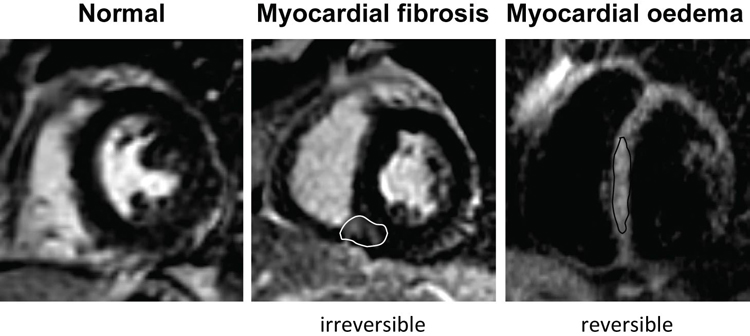Session Information
Session Type: Abstract Submissions (ACR)
Background/Purpose: Cardiac involvement in systemic sclerosis (SSc) affects the prognosis of the disease. Myocardial fibrosis is the pathological hallmark of this complication and has been reported in 50–80% of cases in necropsy. Echocardiography is the routine imaging tool to easily detect cardiac involvement, but it is not accurate to detect myocardial fibrosis. Delayed gadolinium enhancement (DE) cardiovascular magnetic resonance (CMR) is the gold-standard for myocardial fibrosis assessment. The aim of the present study was to evaluate the added value of DE-CMR to echocolorDoppler in SSc patients.
Methods : After a thorough clinical characterization, 171 SSc patients (age=52±14, 91% females, 22% diffuse form) underwent, on the same day, a comprehensive echocardiogram, including tissue Doppler imaging (TDI), and a DE-CMR.
Results : Echocardiography showed normal systolic function (ejection fraction>50%) and wall motion score index (=1) in 100% of patients, whereas DE-CMR showed a pattern of non-ischaemic myocardial fibrosis in 12/53 (23%) patients. In 2/53 patients (4%), T2-weighted CMR showed myocardial oedema, that resolved after steroid therapy. No clinical parameter (age, duration of disease, limited or cutaneous form, Scl-70 positivity, Rodnan skin score, activity score) was an independent predictor of the presence of myocardial fibrosis.
Conclusion : Subclinical cardiac involvement is relatively frequent in SSc and is not necessarily related to duration of disease or other clinical characteristics. CMR can detect different patterns of reversible (by T2-weighted) and irreversible (by DE) cardiac involvement (see figure), not detectable by echocardiography.
Disclosure:
L. Gargani,
None;
A. Pingitore,
None;
D. De Marchi,
None;
S. Guiducci,
None;
G. Todiere,
None;
S. Bellando Randone,
None;
C. Bruni,
None;
M. Doveri,
None;
L. Bazzichi,
None;
S. Bombardieri,
None;
M. Lombardi,
None;
E. Picano,
None;
M. Matucci Cerinic,
None.
« Back to 2012 ACR/ARHP Annual Meeting
ACR Meeting Abstracts - https://acrabstracts.org/abstract/cardiac-involvement-in-systemic-sclerosis-the-added-value-of-magnetic-resonance-imaging/

